 |
| August 15, 2017 | Volume 13 Issue 31 |
Designfax weekly eMagazine
Archives
Partners
Manufacturing Center
Product Spotlight
Modern Applications News
Metalworking Ideas For
Today's Job Shops
Tooling and Production
Strategies for large
metalworking plants
FCA, Toyota, Faurecia, and AP&T win Altair Enlighten Award for automotive lightweighting innovation
Honda and Constellium were runners-up.
Engineering software provider Altair and the Center for Automotive Research (CAR) recently announced the winners of the 5th annual Altair Enlighten Award, which strives to promote and celebrate innovation in automotive lightweighting.
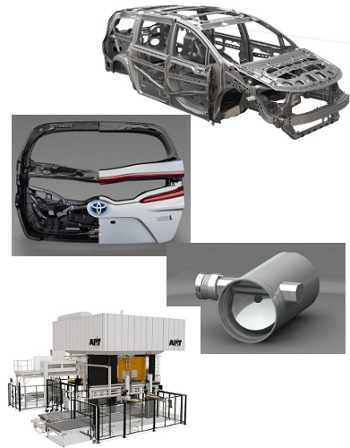
The awards were presented July 31 at the 2017 CAR Management Briefing Seminars (MBS) in Traverse City, MI.
The winner of the Full Vehicle category was the 2017 Chrysler Pacifica, which is an impressive 249 lb (113 kg) lighter than its predecessor. Toyota's carbon fiber closure panels for the 2017 Prius Prime and Lexus LC500, and Faurecia's Adaptive Valve for exhaust systems employed on the 2017 Chevrolet Silverado, took the top honors for the module category. Swedish metal-forming specialist AP&T claimed the Enabling Technology category for its innovative aluminum-forming technology used on several European vehicles.
"For the 5th year, our expanding field of global entries demonstrates an incredibly impressive range of innovations helping to meet the worldwide weight-reduction challenges of modern automotive manufacturing," said judging chair Dr. Jay Baron, president and CEO of CAR and director of CAR's Coalition for Automotive Lightweighting Materials. "FCA, Toyota, Faurecia, and AP&T and all our 2017 finalists are contributing to reductions in weight, fuel consumption, and CO2 emissions."
The Altair Enlighten Award honors the greatest achievements in vehicle weight saving each year to provide an incentive for sharing technological advances. The award is judged by a combination of automotive experts from industry, academia, and the engineering media from across the world. This year they debated the merits of each of the 29 finalists.
The Fiat Chrysler Automobiles (FCA) team built the 2017 Chrysler Pacifica from the ground up to achieve a lighter vehicle with improved safety, better NVH (noise, vibration, and harshness) performance, and superior interior space and comfort. The body system, which shed 168 lb (76 kg), utilized high-strength steels and large amounts of dual-phase and hot-stamped material grades for improved impact protection at reduced weight.
Aluminum and cast magnesium were used for the rear sliding door, liftgate, and the instrument panel beam, while the front-end module is a steel-plastic overmold to improve part integration and stiffness. Simulation methodologies including topology optimization studies were used throughout the vehicle's development to ensure a material-efficient design.
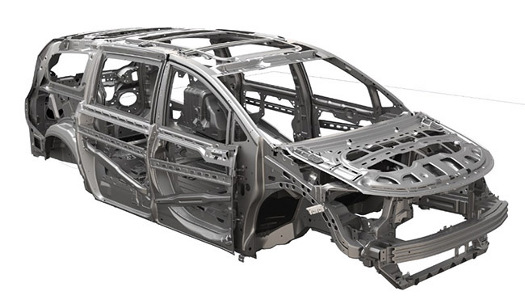
"The 2017 Chrysler Pacifica is our engineering response to the rapidly changing industry climate," said Phil Jansen, head of Product Development, FCA North America. "Customers are in need of ever-greater efficiency, but not at the expense of functionality. The Pacifica's spacious package, delivered with a reduction in mass, allows us to exceed expectations."
For the module category, which focuses on vehicle systems, subsystems, and components, the international judging panel could not determine a single winner, so it opted to award the top prize to both Toyota and Faurecia.
Toyota's winning entry focused on the side and luggage doors of the 2017 Lexus LC and the liftgate of the 2017 Toyota Prius Prime (shown), which both feature carbon fiber-reinforced plastic (CFRP) inner panels combined with aluminum, glass-fiber reinforced plastic (GFRP), and polypropylene outers for components that are 47% lighter than conventional metal structures.
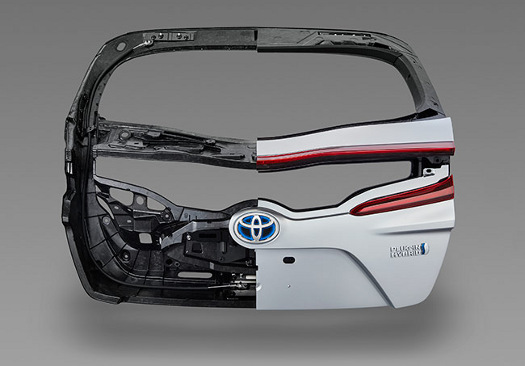
"With CFRP applied to the Prius Prime liftgate and the Lexus LC side and luggage doors, our customers can recognize the light touch and high-tech appearance of these sophisticated, lightweight door systems," said JP Flaharty, executive program manager at Toyota Motor North America R&D.
Faurecia's winning entry was the Adaptive ValveT, an offset shaft spring-return butterfly valve located in the intermediate pipe of the exhaust system. Its specific purpose is to address NVH concerns caused by cylinder deactivation by presenting the gas flow with a variable restriction. The valve requires less package space than traditional systems, and its innovative design reduced the muffler weight of the 2017 Chevrolet Silverado by 26.5 lb (12 kg).
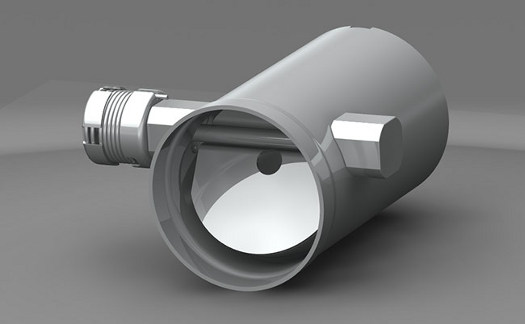
Finally, the Enabling Technology category (a new award introduced in 2017 to recognize technological advances that enable manufacturers to save weight) was claimed by AP&T. The company's aluminum-forming technology is the world's first multipurpose production line for high-strength aluminum sheet metal, enabling flexibility in the forming of high-strength car-body components with complex shapes, leading to weight savings between 30% and 50%.
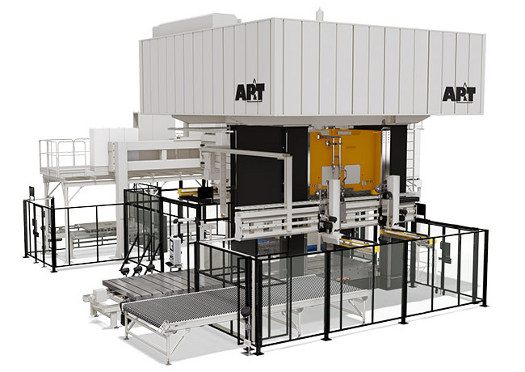
"The multipurpose production line we developed enables outstanding flexibility in the forming of high-strength aluminum components (AA6xxx and AA7xxx) as well as an enhancement in freedom of design, making function and part integration possible in new ways," said Christian Koroschetz, CTO, Technology Development at AP&T.
The runner-up for this year's Full Vehicle award was Honda for its multi-material space frame used to make the 2017 Acura NSX 48.5 lb (22 kg) lighter.
Constellium claimed the second-place title in the Enabling Technology category for its HSA6 aluminum alloys, which support the development of vehicles that are 15% to 30% lighter than those produced using conventional 6000-series aluminum alloys.
"Sharing knowledge and experiences through the award helps us all to collectively meet the challenges of weight and CO2 reduction," said Richard Yen, senior vice president, Automotive and Global Markets Team at Altair. "It's clear that simulation software is playing a central role in this effort, with almost all of the full-vehicle and module entries citing the use of design optimization technologies to generate innovative, material efficient products."
Altair offers software in five categories related to Computer Aided Engineering (CAE) and High-Performance Computing (HPC):
- Solvers and Optimization;
- Modeling and Visualization;
- Industrial and Concept Design;
- Internet of Things; and
- High-Performance Computing.
Source: Altair
Published August 2017
Rate this article
View our terms of use and privacy policy
